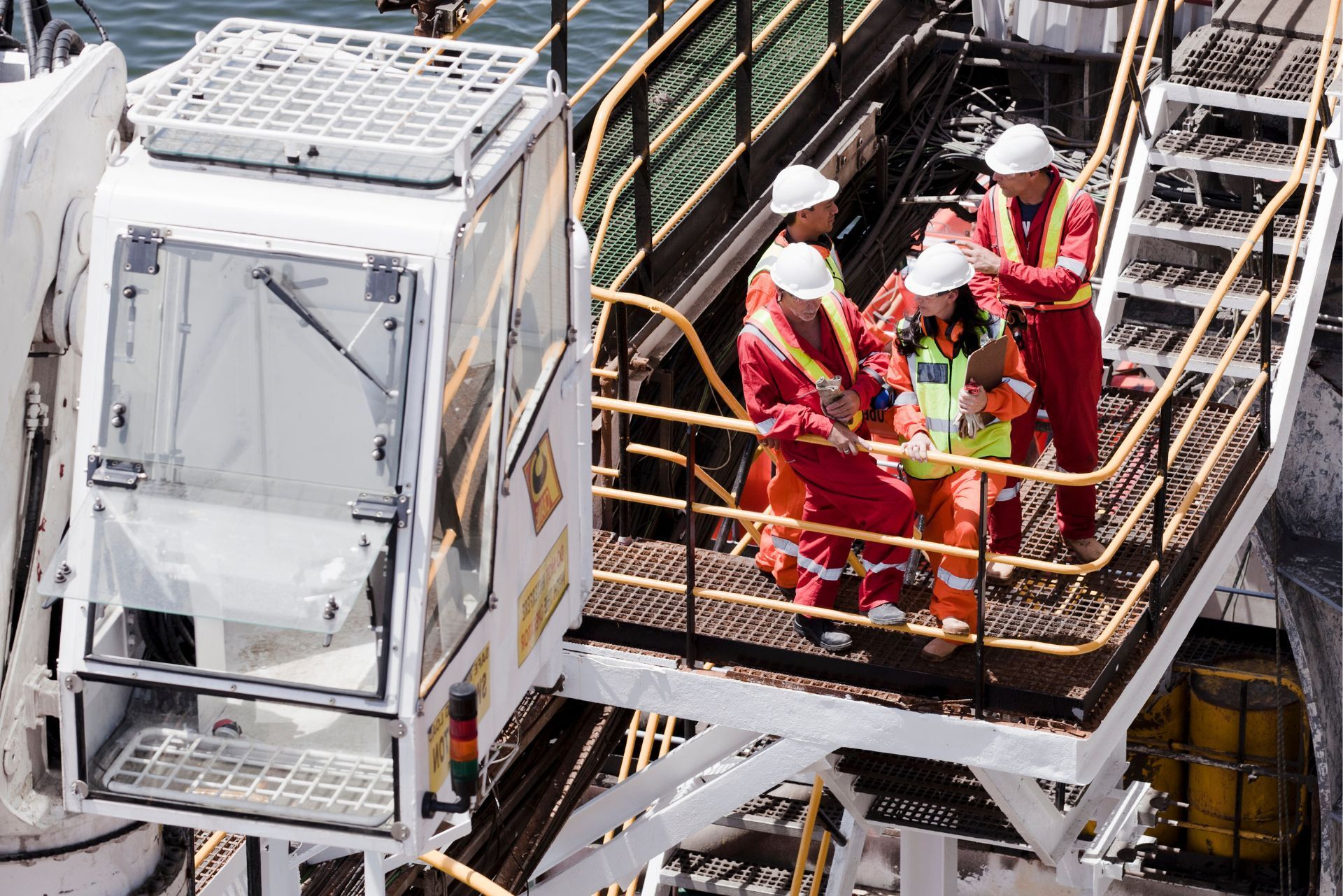Top 3 Recommended Policies

Operating a well maintenance business involves unique risks that require specialized insurance coverage. From protecting expensive equipment to managing liability exposures, having the right insurance policy is essential for sustaining your business and safeguarding your assets. As the global business insurance market continues to grow, reaching an anticipated value of $8.4 trillion by 2027, it's clear that comprehensive coverage is becoming increasingly vital for businesses across all industries, including well maintenance (ProfileTree).
This article delves into the key aspects of well maintenance business insurance, explaining the types of coverage available, why they matter, and how evolving risks are shaping the insurance landscape for this sector.
Understanding the Risks in Well Maintenance Businesses
Well maintenance companies face a variety of risks that can impact their operations and financial stability. These include property damage, equipment breakdown, environmental hazards, and liability claims from clients or third parties. The presence of high-tech equipment, such as electronic monitoring systems and specialized machinery, increases the value at risk and the potential for costly losses.
Industry experts highlight that the changing nature of property risks, especially with advanced equipment in operational facilities, is driving an increase in insured property losses. Michele Sansone, Chief Underwriting Officer for Property at AXA XL, notes that these evolving risks require businesses to reassess their insurance needs carefully (riskandinsurance.com).
Additionally, natural disasters and climate change pose significant threats to well maintenance operations, particularly those located in vulnerable geographic regions. Without adequate insurance, companies risk severe financial consequences and even permanent closure following such events, as studies have shown uninsured businesses are about 30% more likely to shut down within two years after a natural disaster (ProfileTree).
Moreover, the regulatory landscape surrounding well maintenance is constantly evolving, adding another layer of complexity to risk management. Companies must stay informed about local, state, and federal regulations that govern water quality, environmental protection, and worker safety. Non-compliance can lead to hefty fines and legal repercussions, further straining a company's resources. Regular training and updates for staff on these regulations are essential to mitigate these risks and ensure that operations remain within legal boundaries.
Furthermore, the human element cannot be overlooked in the risk assessment process. Employee safety is paramount in well maintenance operations, where workers often face hazardous conditions. Implementing robust safety protocols and providing comprehensive training can significantly reduce the likelihood of workplace accidents. Companies that prioritize employee well-being not only foster a safer work environment but also enhance their reputation, which can be a critical factor in attracting new clients and retaining existing ones in a competitive market.

Essential Types of Insurance for Well Maintenance Businesses
Given the complex risk profile of well maintenance firms, several types of insurance policies are typically recommended to provide comprehensive protection:
General Liability Insurance
This coverage protects against third-party claims of bodily injury, property damage, and related legal costs. For well maintenance companies, liability claims might arise from accidents on job sites or damage caused during maintenance activities. It's crucial for businesses to understand the nuances of this coverage, as it can also extend to claims arising from advertising injuries, such as defamation or copyright infringement, which can occur in marketing materials.
Property Insurance
Property insurance covers physical assets such as office buildings, warehouses, tools, and specialized equipment. With the increasing use of sophisticated technology in well maintenance, protecting these assets against fire, theft, or accidental damage is critical. Additionally, many policies can be tailored to include coverage for business interruption, ensuring that companies can recover lost income if operations are halted due to a covered event, such as a natural disaster or equipment failure.
Equipment Breakdown Insurance
Because well maintenance relies heavily on machinery and electronic devices, equipment breakdown insurance is vital. It covers repair or replacement costs resulting from mechanical or electrical failures, minimizing downtime and financial loss. This type of insurance can also encompass losses related to spoiled materials or products, which is particularly important for businesses that rely on precise operations and timelines to meet client demands.
Environmental Liability Insurance
Given the potential for environmental contamination during well servicing, this insurance protects against claims related to pollution or environmental damage. It is especially relevant for businesses operating near sensitive ecosystems or water sources. Furthermore, many policies now offer coverage for regulatory defense costs, which can be substantial if a company faces legal action from environmental agencies or local governments due to alleged violations.
Workers’ Compensation Insurance
Protecting employees is a legal requirement in most jurisdictions. Workers’ compensation covers medical expenses and lost wages if workers are injured on the job, which is particularly important in physically demanding and hazardous industries like well maintenance. Additionally, some policies may provide rehabilitation services and vocational training for injured workers, helping them return to work more swiftly and safely, which benefits both the employee and the employer.
Cyber Insurance
As the industry adopts more digital tools and data management systems, cyber risks have become a growing concern. In 2023, U.S. companies wrote $9.84 billion in cyber insurance premiums, accounting for 59% of the global total, reflecting the increasing importance of this coverage (Fit Small Business).
Cyber insurance can cover a range of incidents, including data breaches, ransomware attacks, and even business interruption due to cyber incidents. As the threat landscape evolves, businesses must stay informed about the latest cyber threats and ensure their coverage adequately reflects their specific risks and vulnerabilities.
How Climate Change and Emerging Risks Influence Insurance Needs
The insurance landscape is rapidly evolving due to emerging risks such as climate change and cyber threats. For well maintenance businesses, these factors necessitate a proactive approach to insurance coverage.
In 2025, 61% of U.S. construction firms expanded their insurance policies to address rising risks from climate change and cyberattacks, signaling a broader trend that well maintenance companies should heed (CoinLaw).
Climate-related events like floods, storms, and wildfires can cause significant damage to well sites and infrastructure. Insurers are responding by increasing premiums in disaster-prone areas by 15-20% since 2023 to offset rising claims and reinsurance costs. Some are even withdrawing from high-risk geographic markets altogether (Scottmax.com).
For well maintenance businesses, this means insurance costs may rise, and coverage options could become more limited in vulnerable locations. It is crucial to work closely with insurance providers to tailor policies that reflect these changing risks and ensure adequate protection.
Moreover, the increasing frequency and severity of climate-related incidents are prompting insurers to develop more sophisticated risk assessment models. These models not only evaluate historical data but also incorporate predictive analytics to forecast future risks based on climate trends. Well maintenance companies must stay informed about these developments, as understanding the metrics used by insurers can lead to better negotiation of terms and premiums. Additionally, adopting risk mitigation strategies, such as investing in resilient infrastructure and implementing emergency response plans, can significantly enhance a company's insurability.
On the cyber front, the rise of digital technologies in well maintenance operations has introduced new vulnerabilities. With the increasing reliance on data management systems and IoT devices, businesses are more exposed to cyberattacks that can disrupt operations and compromise sensitive information. Insurers are now offering specialized cyber insurance products that cater to these evolving needs, which can help businesses recover from potential breaches. As such, well maintenance companies should not only consider traditional coverage but also explore these emerging insurance options to safeguard against the multifaceted risks they face in a rapidly changing environment.
Leveraging Technology to Improve Risk Assessment and Insurance Processes
Advancements in technology are transforming how insurance companies assess risks and underwrite policies for industries like well maintenance. One promising development is the use of machine learning to analyze building blueprints and infrastructure layouts automatically. A 2022 study explored the feasibility of this approach, which could lead to more accurate and efficient risk assessments (arXiv).
For well maintenance businesses, embracing such innovations can facilitate better communication with insurers and potentially result in more customized and cost-effective coverage. Additionally, investing in risk mitigation technologies, such as remote monitoring and predictive maintenance tools, can reduce the likelihood of claims and improve overall safety.
Moreover, the integration of Internet of Things (IoT) devices into well maintenance operations allows for real-time data collection and analysis. These devices can monitor various parameters such as pressure, temperature, and flow rates, providing invaluable insights into the operational health of wells. By leveraging this data, companies can proactively address potential issues before they escalate into costly failures, thereby enhancing their risk profile in the eyes of insurers. This proactive approach not only minimizes downtime but also contributes to a more sustainable and efficient operation.
Furthermore, the use of blockchain technology in insurance processes is gaining traction, offering a secure and transparent method for managing contracts and claims. Smart contracts can automate the claims process, ensuring that payouts are made quickly and fairly based on pre-defined criteria. This not only streamlines operations but also builds trust between insurers and policyholders, as the terms of coverage and claims handling become more transparent. As these technologies continue to evolve, they hold the potential to revolutionize the insurance landscape, making it more responsive to the unique challenges faced by industries like well maintenance.

Why Well Maintenance Businesses Cannot Afford to Be Uninsured
The financial impact of operating without insurance can be devastating. The Federal Reserve Bank of New York found that companies lacking insurance are roughly 30% more likely to close permanently within two years following a natural disaster (ProfileTree).
For well maintenance firms, which often operate in environments susceptible to environmental hazards and equipment failures, insurance is not just a regulatory formality—it is a critical component of business continuity planning. Without proper coverage, even a single incident can lead to costly lawsuits, equipment replacement bills, and operational downtime that threaten the company’s survival.
Moreover, clients and partners increasingly expect well maintenance providers to carry comprehensive insurance as a sign of professionalism and reliability. Being adequately insured can enhance your business reputation and open doors to larger contracts and partnerships.
In addition to protecting against financial loss, insurance can also provide access to valuable resources and expertise. Many insurance providers offer risk management services that can help businesses identify potential hazards and implement safety protocols. This proactive approach not only mitigates risks but can also lead to reduced premiums over time. For well maintenance businesses, where the stakes are high and the environment is often unpredictable, leveraging these resources can be a game changer, ensuring that operations run smoothly and safely.
Furthermore, the nature of well maintenance work often involves significant investments in specialized equipment and skilled labor. Without insurance, these assets are left vulnerable to unforeseen events such as accidents or natural disasters. The cost of replacing or repairing damaged equipment can be astronomical, and without insurance, these expenses would need to be covered out-of-pocket, potentially crippling the business. Therefore, having the right insurance coverage not only safeguards physical assets but also secures the livelihoods of employees who depend on the company for their income.
Conclusion: Securing the Future of Your Well Maintenance Business
Well maintenance businesses face a complex array of risks that demand thoughtful and comprehensive insurance strategies. From general liability and property insurance to emerging needs like cyber coverage and environmental liability, protecting your business assets and operations is essential in today’s dynamic environment.
As the global business insurance market grows and adapts to new challenges, staying informed about industry trends and working closely with knowledgeable insurance providers will help ensure your well maintenance company remains resilient. By investing in the right insurance policies, you safeguard not only your equipment and employees but also the long-term viability of your business.
For more insights on evolving insurance trends and risk management strategies, exploring resources like
riskandinsurance.com and
CoinLaw can provide valuable guidance tailored to industries with specialized operational risks.
Contact Us
Phone
Location
9595 Six Pines Dr, Suite 8210, The Woodlands, TX 77380

